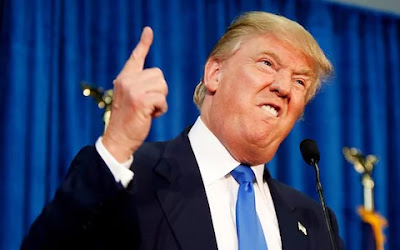What can we Learn from Donald J. Trump?
The
brash 45th president of the United States has been given many
unflattering names in the time since he announced his running for the
Presidency; but the fact of the matter is that Trump is president, which begs the question – what can one learn from
him? If the reader feels that this very question is ridiculous, I venture to
say that he is not alone. This reaction would be, however, a manifestation of
pride, which proclaims that there is “nothing to learn”; open your eyes to the fact
of Trump’s achievements and the importance with which the world holds his words
(whether positively or negatively, it matters not – it is the degree of impact
which matters).
This
article will point out three aspects of Trump which bear greater discussion:
his charisma, his name-calling and his characterisation of his adversaries.
Charisma
Trump
is possessed of a certain charisma which convinces certain people of the most
incredulous things he says. Yet his casually thrown, seemingly mindless
soundbites stick with people. They influence people, for better or for worse.
What is charisma? The Oxford English Dictionary defines it as: “Compelling attractiveness
or charm that can inspire devotion in others.” Trump’s attractiveness lies in
his strongman attitude, his brazen laudations of his numerous victories and how
he can help America “win” too. Unlike other politicians (despite passing
himself off as the consummate outsider, the reality is that he was a politician
from the moment he announced his running for the presidency – and even before
that), he seems careless with his words. In actuality, he uses words in a way
which emphasises a single monolithic idea, always stressing with rambling
consistency a condensed phrase (a deliberative
controversial phrase): “America First!”, “Build a Wall!” etc.
The
driving force for Trump’s support is nationalism. In an age where ties have
been disintegrated by globalising influences, more people than ever flock to
the “Make America Great Again” banner in a reaction against a perceived attack
on traditional values. The key is playing upon those fears. Any renown
politician knows to use his supporter’s fears to advance his agenda. Make no
mistake, every politician worth his salt does this and it is no more a bad thing than it is a good thing.
Yet
the words alone cannot constitute charisma without the foundation of
confidence. Such confidence is manifest in Trump’s delivery (read: body language and diction) – sometimes laid-back,
sometimes loud, always punctuated with gestures. More importantly, it is always
calculated to project an aura of unshakable strength. As a result, his
supporters focus on his strengths as a leader and forget the details.
Paradoxically, the very absurdity of his words (I am the smartest… I have big
hands…) works to his advantage, drawing in people to ridicule him, yet exposing
them to his undeniably well-chosen rallying points. “America First” is prima facie nationalist, not racist –
which begs the question, why is it bad? That is the dilemma of the Left, who
have to twist around themselves to cast a phrase in the worst light possible,
exposing them to the accusation of hypocrisy.
However,
no technique is perfect. Trump’s wild gesticulations detract from his message.
When he has one, he tends to be sparse on the details and heavy on the
generalisations. Nuance is lost when he translates his ideas to the vernacular
of the masses. If Trump is as laissez-faire with his words as he is with
matters of government, then no long-term plan can be properly implemented – the
minutiae of government do not attend to themselves.
I am
inclined to think that Trump’s speech is not merely careless. Long meandering speeches
will be lost on a political audience, while Trump’s repetition hammers in his
simple message clearly and concisely. All his other utterances are mostly just
chaff. It is telling that the vocabulary Trump uses in his speeches was
assessed at a 4th grade level according to an analysis of speech
patterns via the Flesch-Kincaid method: http://www.newsweek.com/trump-fire-and-fury-smart-genius-obama-774169
Simple
means easy to understand.
“If
I'm president, we will win on everything we do.” – Donald Trump
Name-calling
One
of the most well-known of Trump’s idiosyncrasies is his penchant for casting
pejorative epithets (Lyin’ Ted, Low-energy Jeb, Crooked Hillary) at his
opponents. There is no field other than politics where this can be done so
blatantly and with so much success. The key to such name-calling is to
permanently smear the names of one’s opponents.
Its
efficacy can be seen in this video: https://www.youtube.com/watch?v=EkCifM0kDd0
While
I would not recommend the use of such tactics at work (it would alienate rather
than attract people), the fact of the matter is that this is commonplace in
social life. If you are part of the bulk of people would much rather guard
against than promulgate unbecoming gossip, staying silent is perhaps the worst
thing to do. Rather, one should show (through action, not only words) the
unjustified basis for such unflattering epithets. Of course, this can only work
if there is no basis for these names in the first place.
If
you are part of those who would be advantaged by such political shenanigans,
only cast such epithets if they are ‘justified’; one should always be able to
justify one’s actions. A lack of basis can undermine one’s credibility and look
hypocritical. I must pause here to define what I mean by ‘justified’ – I do not
use this in any rigorous manner, but instead mean that one should be able to
explain one’s actions by reference to some commonly held notion of acceptable
conduct. For example, if many people have a similar view of a co-worker, I
would venture to say characterising him as ‘lazy’ or ‘unmotivated’ or whatever
would not be controversial. The essence is in channelling people’s perceptions; it is not possible to create
perceptions out of thin air given the average amount of social clout any
ordinary person has. While this common view might not have any evidential
basis, and thus is not strictly justified, this is enough to guard oneself from
accusations of hypocrisy (for the most part). I note that Trump does not in
fact cast aspersions without basis – his basis might be flimsy, but that is not
the same as having no basis. For example, the accusation he levelled against
‘Crooked Hillary’ for her use of her family’s private email server to handle
‘confidential emails’ – these were accusations which were prima facie plausible (it in fact warranted an investigation by the
FBI).
Note: There is always a risk of such
accusations backfiring. I would recommend not attempting to disparage persons
on a regular basis unless one’s skin is as thick as Trump’s. One must be able
to take what one dishes out, since insulting words always finds its way back to
the provocateur.
Remember:
if one is faced with such disparagement, the worst thing that one can do is
lose control of one’s temper. That shows weakness and a lack of control.
Rather, assert control over the
situation by giving as good as you take.
"If
'Lyin' Ted' Cruz came today, he couldn't draw 100 people...He lies like crazy,
but most of the time I win the evangelical vote." – Donald Trump
Characterising
the Enemy
Casting
one’s enemies as the ultimate evil is not a new stratagem. Statesmen have for
ages known the value of moralistic talk: Ronald Reagan referenced this age-old
concept of Good vs. Evil in his “Evil Empire” speech of 1983 (https://www.youtube.com/watch?v=do0x-Egc6oA):
Yes, let us pray for the
salvation of all of those who live in that totalitarian darkness—pray they will
discover the joy of knowing God. But until they do, let us be aware that while
they preach the supremacy of the State, declare its omnipotence over individual
man, and predict its eventual domination of all peoples on the earth, they are
the focus of evil in the modern world.... So, in your discussions of the
nuclear freeze proposals, I urge you to beware the temptation of pride—the
temptation of blithely declaring yourselves above it all and label both sides
equally at fault, to ignore the facts of history and the aggressive impulses of
an evil empire, to simply call the arms race a giant misunderstanding and
thereby remove yourself from the struggle between right and wrong and good and
evil.
Here,
there are no shades of grey, no place for neutrality. As the later President
George W. Bush put it, “You're either with us, or against us”. There is only
good and evil, no in-between; and when the enemy is a monolithic evil empire, the
natural moral impulses of men urge them uncompromisingly to its destruction.
Yet later
historians, all adequately apprised of the “facts of history”, have seen the Cold
War divide with greater nuance than Ronald Reagan illustrated it. Of course,
this was due to no fault of Reagan nor any inadequacy in intelligence – it was
a response to the exigencies of his situation and a method of whipping up
public support for his hardline policies. As any historian will tell you, the
pressure Reagan put on the Soviet Union in accelerating the arms race put an enormous
strain on the latter’s economy, contributing greatly to its later economic and
political collapse.
Characterising
the enemy in the right way is therefore relevant to raising support from the
masses. Trump knows this, painting his adversaries and whole sections of the
population with a broad brush because it aims support in the right direction. It
is not always clear, but I venture to say that he understands the disparity
between what he says US’ problem is and what it actually is; it does not serve
his purposes to tease out the relevant details, for it might be far too complex
for the masses. Pointing to a common enemy – a common evil – united his
supporters and gave him the Presidency.
In
this, then, the relevant learning is in what best excites the passions of men.
It is believing oneself on the side of good, engaged in a battle against the relevant
evils.
"When
Mexico sends its people, they're not sending the best. They're sending people
that have lots of problems and they're bringing those problems. They're
bringing drugs, they're bringing crime. They're rapists and some, I assume, are
good people, but I speak to border guards and they're telling us what we're
getting." – Donald Trump
Conclusion
There
is, no doubt, much more that could be said about the techniques of Donald Trump,
but these are ones which he uses most blatantly and most successfully. His
successes bear further study, and they can be misinterpreted if cast wholly in
a bad light. No matter what those politically opposed to him might say, he has
already had some achievements – the question now is whether these will outweigh
the ills of his Presidency.
Frederick Yorck
Frederick Yorck




Comments
Post a Comment